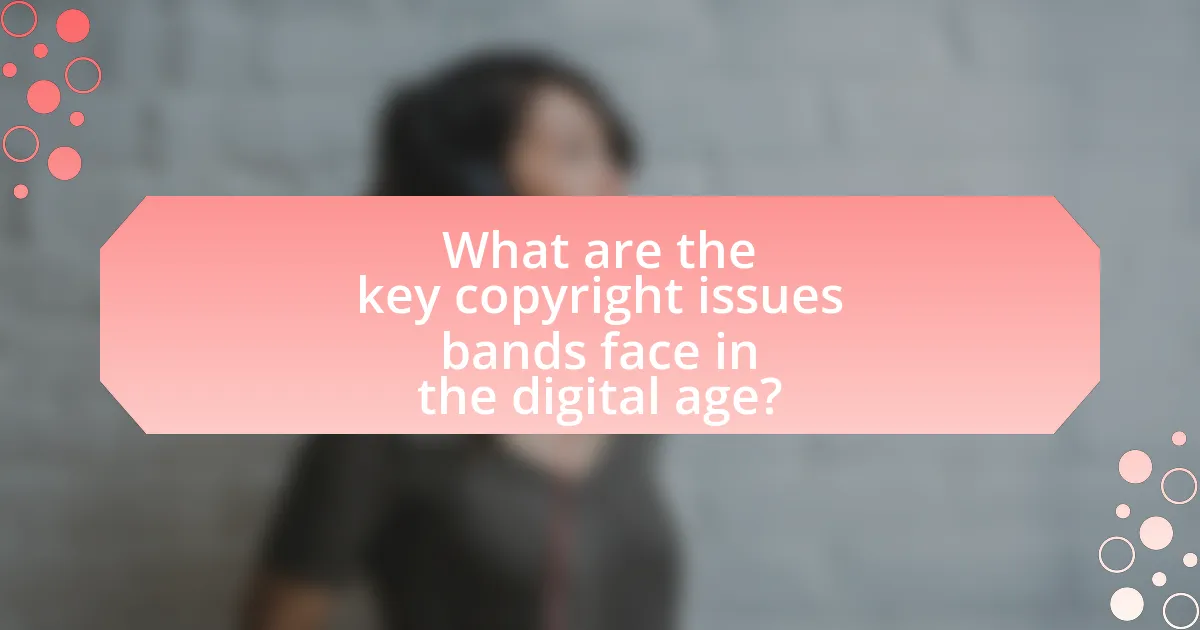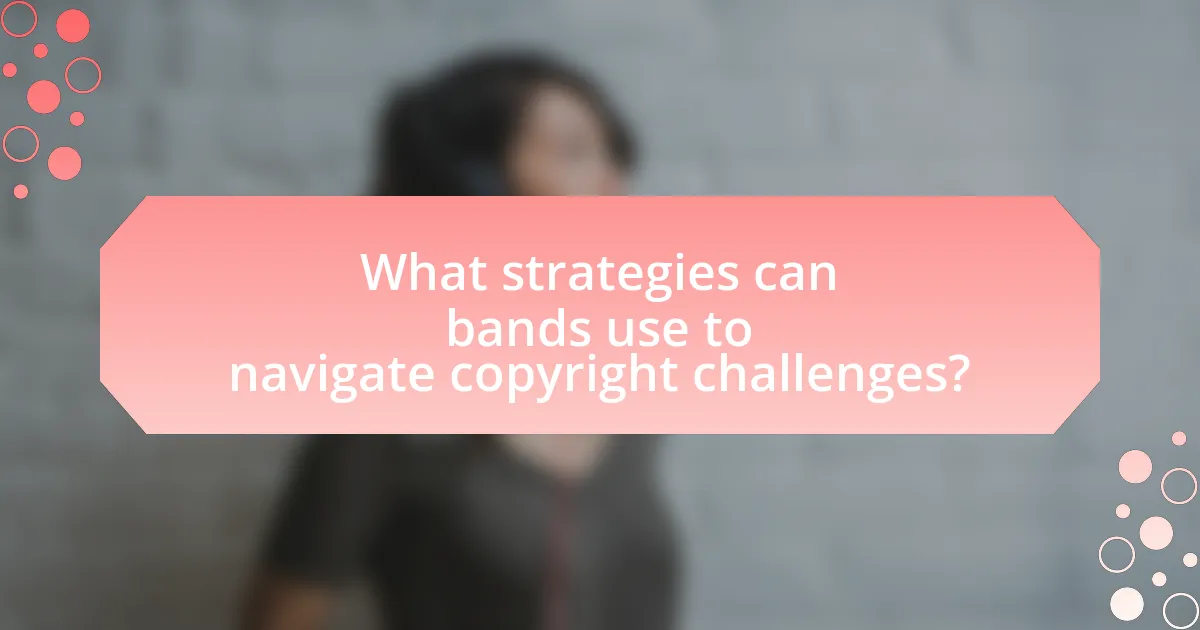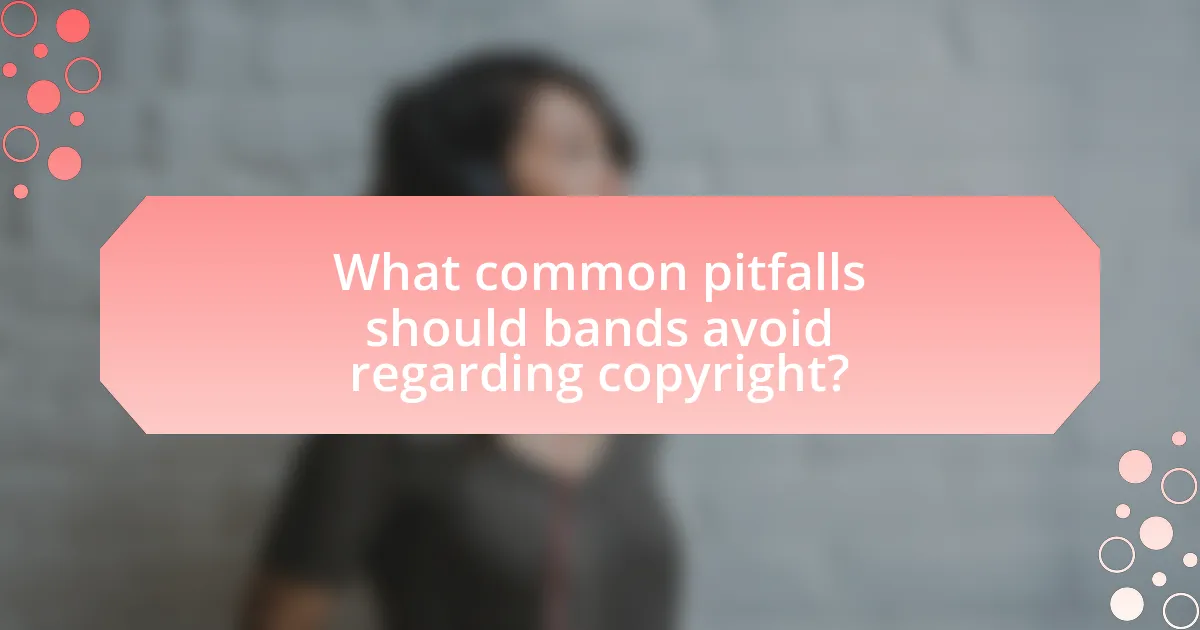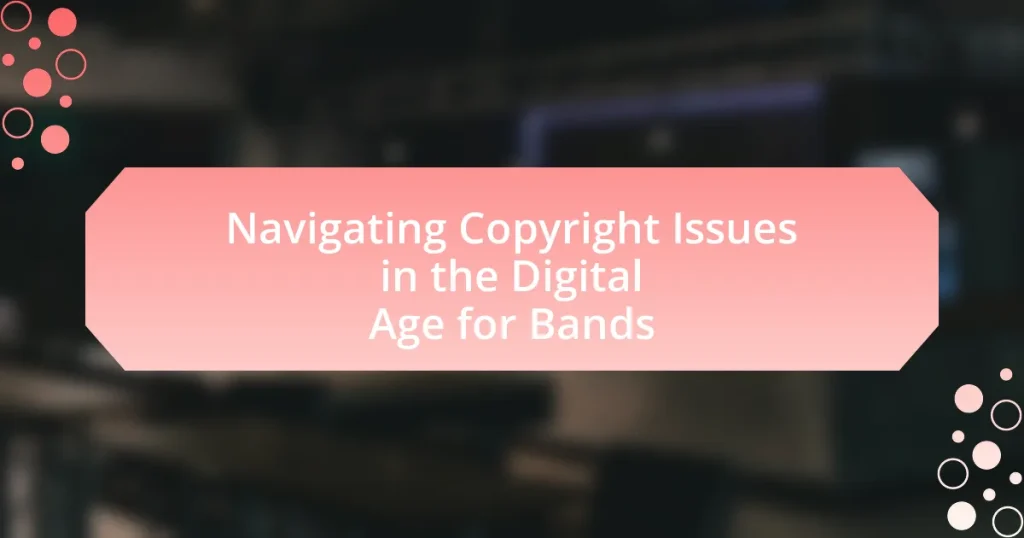The article focuses on the key copyright issues that bands encounter in the digital age, including unauthorized distribution of music, licensing challenges with streaming platforms, and the complexities of protecting intellectual property. It highlights the impact of digital distribution on copyright ownership and the legal implications of streaming music online. Additionally, the article discusses the role of social media in copyright issues, strategies for protecting music, and the importance of understanding copyright law to safeguard creative works. It also outlines best practices for licensing, registration, and the use of technology to manage copyright effectively.

What are the key copyright issues bands face in the digital age?
Bands face several key copyright issues in the digital age, primarily including unauthorized distribution of their music, challenges in licensing for streaming platforms, and difficulties in protecting their intellectual property. Unauthorized distribution occurs when music is shared or downloaded without the band’s consent, often through peer-to-peer networks or illegal streaming sites, undermining their revenue. Licensing challenges arise as bands must navigate complex agreements with streaming services, which may not adequately compensate them for their work; for instance, the average payout per stream on platforms like Spotify is significantly lower than traditional sales. Additionally, protecting intellectual property has become more complicated due to the ease of copying and sharing digital content, making it essential for bands to actively monitor and enforce their rights through legal means.
How does digital distribution impact copyright for bands?
Digital distribution significantly impacts copyright for bands by altering how their music is accessed, shared, and monetized. With platforms like Spotify and Apple Music, bands face challenges in protecting their intellectual property due to the ease of copying and distributing digital files. According to the Recording Industry Association of America (RIAA), digital music revenues surpassed physical sales for the first time in 2015, highlighting the shift in consumption but also the complexities of copyright enforcement in a digital landscape. This shift necessitates that bands understand licensing agreements and digital rights management to safeguard their work effectively.
What are the legal implications of streaming music online?
Streaming music online has significant legal implications primarily related to copyright law. When music is streamed, the platform must obtain licenses from copyright holders, including songwriters, performers, and record labels, to avoid infringement. The Digital Millennium Copyright Act (DMCA) provides a framework for addressing copyright issues, requiring platforms to respond to takedown notices and implement measures to prevent unauthorized content. Additionally, failure to secure proper licenses can result in legal action, including fines and lawsuits, as seen in cases involving major streaming services. Thus, understanding and adhering to copyright regulations is crucial for any entity involved in online music streaming.
How do digital downloads affect copyright ownership?
Digital downloads impact copyright ownership by allowing consumers to obtain copies of copyrighted works without transferring ownership of the copyright itself. When a digital download occurs, the copyright holder retains the exclusive rights to reproduce, distribute, and display the work, while the consumer typically receives a limited license to use the content for personal purposes. This distinction is supported by copyright law, which states that the sale of a digital copy does not equate to the sale of the copyright; thus, the original creator maintains control over the intellectual property.
What role do social media platforms play in copyright issues?
Social media platforms serve as intermediaries in copyright issues by facilitating the sharing and distribution of copyrighted content. These platforms often host user-generated content that may infringe on copyright laws, leading to legal challenges for both users and copyright holders. For instance, the Digital Millennium Copyright Act (DMCA) provides a framework for copyright owners to request the removal of infringing content, which social media platforms must comply with to avoid liability. In 2020, a report indicated that over 1.5 million DMCA takedown notices were issued to platforms like YouTube and Facebook, highlighting the significant role these platforms play in managing copyright disputes.
How can bands protect their music on social media?
Bands can protect their music on social media by registering their works with copyright offices and using digital rights management tools. Copyright registration provides legal proof of ownership, making it easier to enforce rights against unauthorized use. Additionally, platforms like YouTube and Facebook offer content identification systems that help detect and manage unauthorized uploads of copyrighted music. According to the U.S. Copyright Office, registration is crucial for bands seeking to pursue legal action against infringers, as it allows for statutory damages and attorney fees in lawsuits.
What are the risks of sharing music on social media?
Sharing music on social media poses significant risks, primarily related to copyright infringement. When artists share their music without proper licensing or permission, they may violate copyright laws, leading to potential legal action from rights holders. According to the U.S. Copyright Office, unauthorized distribution of copyrighted material can result in statutory damages ranging from $750 to $30,000 per work, and in cases of willful infringement, damages can escalate to $150,000. Additionally, social media platforms often have strict policies that can result in content removal or account suspension for repeated copyright violations. Therefore, bands must navigate these risks carefully to protect their intellectual property and maintain their online presence.
Why is understanding copyright law essential for bands?
Understanding copyright law is essential for bands because it protects their creative works and ensures they receive proper compensation for their music. Copyright law grants bands exclusive rights to their original compositions, recordings, and performances, preventing unauthorized use by others. For instance, in 2020, the U.S. Copyright Office reported that music creators lost an estimated $2.65 billion due to copyright infringement. By comprehending these laws, bands can safeguard their intellectual property, navigate licensing agreements effectively, and pursue legal action against infringement, thereby securing their financial and artistic interests in a competitive digital landscape.
What are the consequences of copyright infringement?
Copyright infringement can lead to significant legal and financial consequences for individuals and organizations. Legal repercussions include lawsuits filed by copyright holders, which can result in substantial monetary damages, often ranging from statutory damages of $750 to $30,000 per work infringed, and in cases of willful infringement, damages can escalate to $150,000 per work. Additionally, copyright infringers may face injunctions that prohibit them from using the copyrighted material, leading to potential loss of business opportunities. Furthermore, repeated infringement can result in criminal charges, with penalties including fines and imprisonment. These consequences underscore the importance of respecting copyright laws, particularly for bands navigating the complexities of the digital age.
How can bands ensure they are compliant with copyright laws?
Bands can ensure compliance with copyright laws by obtaining licenses for any copyrighted material they use, including music, lyrics, and samples. This involves identifying the rights holders of the material and securing the appropriate permissions or licenses, such as mechanical licenses for recordings and synchronization licenses for videos. According to the U.S. Copyright Office, failure to obtain these licenses can lead to legal repercussions, including fines and lawsuits. Additionally, bands should educate themselves about fair use provisions, which allow limited use of copyrighted material without permission under specific circumstances, but this can be complex and context-dependent. By actively managing their use of copyrighted content and seeking legal advice when necessary, bands can navigate copyright issues effectively.

What strategies can bands use to navigate copyright challenges?
Bands can navigate copyright challenges by implementing strategies such as registering their works with copyright offices, utilizing licensing agreements, and leveraging digital distribution platforms that offer copyright protection features. Registering works provides legal proof of ownership, which is crucial in disputes, as it allows bands to enforce their rights effectively. Licensing agreements enable bands to grant permission for others to use their music while retaining ownership, ensuring they receive compensation. Additionally, digital distribution platforms like DistroKid and TuneCore often include tools that help manage copyright claims and protect against unauthorized use, making it easier for bands to maintain control over their intellectual property.
How can bands effectively register their copyrights?
Bands can effectively register their copyrights by submitting their works to the U.S. Copyright Office, which provides legal protection for original music compositions and sound recordings. The registration process involves completing an application form, paying a fee, and providing a copy of the work being registered. According to the U.S. Copyright Office, registration not only establishes a public record of the copyright but also allows bands to pursue legal action against infringement and claim statutory damages. This process is crucial for bands to safeguard their creative output in the digital age, where unauthorized use of music is prevalent.
What steps are involved in the copyright registration process?
The copyright registration process involves several key steps: first, the creator must complete a copyright application form, which can typically be done online through the U.S. Copyright Office website. Next, the creator submits a copy of the work being registered, which can include music, lyrics, or other creative content. After that, the creator pays the required filing fee, which varies depending on the type of work and the method of registration. Finally, the U.S. Copyright Office reviews the application and, if approved, issues a certificate of registration, providing legal evidence of copyright ownership. This process is essential for bands to protect their original works and enforce their rights.
How does registration benefit bands in disputes?
Registration benefits bands in disputes by providing legal evidence of ownership and establishing a public record of their work. This legal recognition strengthens a band’s position in copyright disputes, as registered works are easier to defend in court and can lead to statutory damages and attorney fees if infringement occurs. According to the U.S. Copyright Office, registration is a prerequisite for filing a lawsuit for infringement, which underscores its importance in protecting a band’s rights and interests in their creative output.
What are the best practices for licensing music?
The best practices for licensing music include understanding copyright laws, obtaining necessary permissions, and using clear contracts. Bands should familiarize themselves with the specific rights associated with their music, such as performance rights, mechanical rights, and synchronization rights. Securing licenses from performing rights organizations, like ASCAP or BMI, ensures that artists receive royalties for public performances. Additionally, when collaborating with other artists or using samples, obtaining written agreements that outline usage rights is crucial to avoid legal disputes. These practices help protect the band’s intellectual property and ensure compliance with legal standards in the music industry.
How can bands negotiate licensing agreements?
Bands can negotiate licensing agreements by clearly defining their rights and expectations, engaging in open communication with potential licensors, and leveraging industry standards. Effective negotiation involves understanding the specific terms of the agreement, such as duration, territory, and compensation, which can be benchmarked against similar agreements in the industry. For instance, the American Association of Independent Music (A2IM) provides guidelines that can help bands assess fair licensing terms based on market rates. Additionally, seeking legal advice from professionals experienced in music law can further strengthen a band’s position during negotiations, ensuring that their interests are adequately protected.
What types of licenses should bands be aware of?
Bands should be aware of several types of licenses, including performance licenses, mechanical licenses, synchronization licenses, and master use licenses. Performance licenses are required for live performances and public broadcasts of music, typically obtained through organizations like ASCAP or BMI. Mechanical licenses are necessary for the reproduction of music on physical formats or digital downloads, often managed through the Harry Fox Agency. Synchronization licenses are needed when music is used in audiovisual works, such as films or commercials, and must be negotiated directly with the copyright holder. Master use licenses grant permission to use a specific recording of a song, which is crucial for sampling or including a track in a project. Understanding these licenses helps bands navigate copyright issues effectively in the digital age.
How can bands leverage technology to manage copyright?
Bands can leverage technology to manage copyright by utilizing digital rights management (DRM) tools and blockchain technology. DRM tools help bands protect their music from unauthorized use by controlling access and distribution, while blockchain technology offers a transparent and secure way to register and track ownership of their works. For instance, platforms like Audiosocket and Mycelia use blockchain to ensure that artists receive fair compensation for their music, providing a clear record of ownership and usage rights. This approach not only safeguards their intellectual property but also simplifies the process of licensing and royalty collection, making it easier for bands to navigate the complexities of copyright in the digital age.
What tools are available for tracking music usage online?
Several tools are available for tracking music usage online, including SoundExchange, TuneCore, and Audiam. SoundExchange collects and distributes digital performance royalties for sound recordings, ensuring artists receive compensation for their work played on digital platforms. TuneCore provides distribution services and offers analytics to track music sales and streaming data across various platforms. Audiam specializes in identifying and monetizing music usage on platforms like YouTube, helping artists earn royalties from their content. These tools are essential for artists and bands to monitor their music’s performance and ensure they are compensated fairly in the digital landscape.
How can digital rights management (DRM) protect music?
Digital rights management (DRM) protects music by controlling access and usage rights through encryption and licensing technologies. DRM systems restrict unauthorized copying, sharing, and distribution of music files, ensuring that only users with valid licenses can access the content. For example, platforms like Spotify and Apple Music utilize DRM to prevent users from downloading and redistributing songs without permission, thereby safeguarding the intellectual property of artists and record labels. This protection is crucial in the digital age, where music can be easily replicated and shared, leading to potential revenue loss for creators.

What common pitfalls should bands avoid regarding copyright?
Bands should avoid the common pitfalls of not registering their works, failing to understand fair use, and neglecting to secure licenses for cover songs. Not registering works can lead to difficulties in proving ownership and enforcing rights, as copyright protection is stronger when registration is completed. Misunderstanding fair use can result in unintentional infringement, as fair use is often misapplied in creative contexts. Additionally, neglecting to obtain proper licenses for cover songs can lead to legal repercussions, as performing or distributing covers without permission violates copyright law. These pitfalls can significantly impact a band’s ability to protect their music and generate revenue.
What mistakes do bands often make with copyright?
Bands often make the mistake of not registering their original works with copyright offices, which can lead to difficulties in proving ownership and protecting their music. Without registration, bands may struggle to enforce their rights against unauthorized use, as copyright protection is stronger when works are officially registered. Additionally, many bands fail to understand the importance of securing licenses for samples or covers, which can result in legal disputes and financial penalties. Furthermore, bands often overlook the need for clear agreements among members regarding ownership and revenue sharing, leading to conflicts that can jeopardize their careers.
How can bands avoid unintentional copyright infringement?
Bands can avoid unintentional copyright infringement by conducting thorough research on the originality of their music and ensuring they do not use copyrighted material without permission. This includes checking for similarities with existing songs, utilizing copyright databases, and seeking licenses for any samples or covers. According to the U.S. Copyright Office, using a substantial portion of another artist’s work without permission can lead to legal consequences, emphasizing the importance of due diligence in music creation.
What are the dangers of using samples without permission?
Using samples without permission can lead to legal repercussions, including copyright infringement lawsuits. When an artist or band uses a sample from another work without obtaining the necessary rights, they risk facing significant financial penalties, which can include damages awarded to the original creator. Additionally, unauthorized use can result in the removal of the work from distribution platforms, loss of reputation, and potential criminal charges in severe cases. According to the U.S. Copyright Office, unauthorized sampling is a violation of the Copyright Act, which protects the rights of creators and their works.
How can bands stay informed about copyright changes?
Bands can stay informed about copyright changes by regularly following updates from reputable sources such as the U.S. Copyright Office, music industry associations like the Recording Industry Association of America (RIAA), and legal blogs focused on copyright law. These organizations provide timely information on legislative changes, case law, and best practices for copyright management. Additionally, subscribing to newsletters and attending industry conferences can enhance awareness of evolving copyright issues, ensuring bands remain compliant and informed in the digital landscape.
What resources are available for ongoing copyright education?
Ongoing copyright education resources include the U.S. Copyright Office, which offers comprehensive guides and webinars on copyright law, and organizations like the American Bar Association, which provides resources and continuing legal education on copyright issues. Additionally, online platforms such as Coursera and edX offer courses on copyright law, while industry-specific resources like the Music Publishers Association provide tailored information for musicians. These resources are validated by their established reputations and the expertise they offer in copyright education.
How can bands connect with legal professionals for advice?
Bands can connect with legal professionals for advice by utilizing online legal services, networking at music industry events, and seeking referrals from other musicians. Online platforms like LegalZoom and Rocket Lawyer offer accessible legal consultations tailored for musicians. Additionally, attending music conferences and workshops provides opportunities to meet legal experts who specialize in copyright and entertainment law. Referrals from fellow artists can also lead to trusted legal counsel, ensuring that bands receive relevant and informed advice on navigating copyright issues effectively.
What practical tips can bands implement to protect their music?
Bands can protect their music by registering their works with the U.S. Copyright Office, which provides legal recognition and the ability to enforce rights against unauthorized use. This registration process establishes a public record of the band’s ownership and is crucial for pursuing legal action if infringement occurs. Additionally, bands should use digital distribution platforms that offer copyright protection features, such as Content ID on YouTube, which helps identify and manage unauthorized use of their music online. Furthermore, bands can implement clear licensing agreements when collaborating with other artists or using samples, ensuring that all parties understand their rights and responsibilities. These steps are essential for safeguarding their creative output in the digital landscape.


